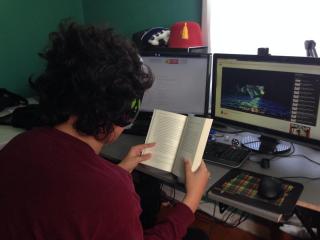
A note I received in 2017 :
My life has changed more than I can express since finding your website Sandra, I have so much more to learn but my mental health thanks you, as well as my marriage and relationship to my child. Thank you.Results like those above come from relaxing into ideas about generosity, gratitude, service, "make the better choice," looking directly at children, living with compassion and patience and humor. Choosing positivity over negativity makes a difference beyond words, and it's only done incrementally. Those ideas permeate people's discussions of unschooling and calmer parenting.
Mostly use Google, read books, do research, go to a counsellor! But don't believe any single source (even a doctor) who just simply states that you need to put your kid on Ritalin, or that your child needs to go to a lock-up treatment place, or that all you need is anti-depressants and you'll be better.
Get other opinions, and find ways to cope with your own personal biochemical realities. Some people are very outgoing, talkative, hyperactive. Some are very still, and need to be alone. They're not "too shy," they're just people within a normal range of personalities.
I'll collect links and good quotes and possible resources, but this isn't an exhaustive list, nor will any other list or site be, anywhere!
Research means reading three or ten places, not just one. Don't consider all sources equal. If you think about it, try it out, and it helps, great! If it doesn't make sense or seems like superstition, be wary.

I understand you're feeling tired of helping new unschoolers. I'm very sorry to read that again (it seems to happen more often, especially here on facebook). I hope you'll stay around to offer advice nevertheless as it is your advice and help that was most valuable to me. Your answers together with those of other experienced unschoolers saved me. I was deep down in depression, having some therapy that helped too little, coming closer to being suicidal, because I had no way to deal with my constant feeling of loneliness. I felt alone, misunderstood, unloved, abandoned. Despite my husband and children.I was tired of trying to be good only to get told again and again by other people what huge failures I've made or how wrong I am. I wanted to leave all this judgment and negativity behind me. I had it all my life and I finally had enough. But I saw no way out.
Then I found your page and ideas. I read, tried, waited, watched. I got confused, worked up the courage to ask questions, read all your answers, tried, waited, watched.
I experienced change in my speech and thought.
All those who can't or don't want to see your clarity (yet), will eventually. Or they won't, but others will.
You sharing your ideas and life experience not only changed the lives of others but you saved mine. I've changed to a better person, mother, partner. I realized I'm a good human being. It took me nearly three years, a lot of courage and effort to do better, to be better.
Now, I want to keep this. It's precious, peaceful and fulfilling.
Marta Venturini, commenting on some writing she saved:
I have no idea why I saved this, but I'm glad I did. Pam Sorooshian's wise words on Always Learning, a long time ago:
Some people are walking around with emotions, beliefs, feelings, thoughts that are not really springing from something currently real in their lives, they are patterns of neurological activity in their brain that are sort of imprinted there, usually from chidhood. They are automatic but inaccurate responses to current conditions. When a child has been frequently shame and humiliated as a child for every little mistake or even just at the whim of a parent, then, when the child grows up, the adult brain will be triggered to experience similar shame and feelings of humiliation for relatively minor things and sometimes even for no real reason at all.I used to feel very uncomfortable with guilt. And I would dwell on it for days, at times.That's one reason people don't feel "authentic." They are feeling emotions that are out of line with current reality. It makes them feel like they are not themselves - they feel disassociated from their current selves. Guilt is often one of those emotions. It isn't comfortable. One reaction to that discomfort is to reject guilt and refuse to feel it. A better reaction is to examine that guilt and figure out intellectually whether it makes sense to feel guilty right then in response to what you really did. Using your more rational intelligence to think about feelings can help clean up those old patterns and free you up to think for yourself now, rather than have automatic responses triggered. Over time, if you do that, guilt will become what you feel when you mess up and don't live up to your own expectations of your own behavior - not something that comes from outside and drags you down. And what will be automatic about it will be the urge to do something to make things right if possible.
—Pam Sorooshian
I'm glad I learned how to not let it take me down but instead to make things better the next time around (with all my relationships, not just with my daughter), with the generous help of such wise moms as Pam and Sandra and many others. It seems like a small detail, but it has been so important for me.
Thank you once again, awesome unschooling moms!
One of the things that I don't think has been mentioned . . . is checks and balances. I sometimes feel like moms want to do whatever they want without ever feeling bad and without ever having their parenting checked. I use feelings of guilt to check myself. I also make sure that our house is one where my husband and children can and will say something if I get too far afield. Even my mom will sometimes say something if she notices me being particularly crabby. I don't see that as them trying to make me feel bad about my choices. I see it as them trying to help me and keep me on track. It is a system of checks and balances that keeps me from becoming the sole voice in the family. I do not want to be the one that makes all of the decisions and tells everybody else what to do and how to do it.
Anyone prone to biochemical swings will have them always, and learning how to deal with them is more valuable and safer than just deciding when to take drugs from time to time in lifeSu responded:
This has been true for me. Therapy has helped me—and my partner— learn to recognize when I am slipping into old patterns of thinking and behavior, and has given me the tools to "pull out of a dive" before it gets so bad I can't get myself out of it. Especially cognitive-behavioral therapy, about which I can hardly say enough good.
Plain and happy advice about lifting depression (and just in case: a backup)
Dealing with others' depression? just a few ideas
Take food. "Never underestimate the value of a casserole," someone wrote.What the mom can do:Offer to take the older child(ren) out and about to give the mom time to be with the baby.
Smell the baby's head!! Breathe it in slowly, don't sniff it. Inhale it gently and deeply. There is biochemical magic there.Do Not Watch the NEWS! Don't read about bad births, or anything about grief or mourning. It won't help your baby.
Do NOT listen to sad music. It won't help your baby.
Don't read magazines that talk about divorce or crime or political evils. It won't help your baby.Do what will help your baby. Be the gentlest, sweetest, most attentive mother you can possibly be, and you will be putting peace in the bank for you and your whole family.
When you are kind, it changes the kind of person you are. When you are patient, it makes you a better person.
More simply put, kind is kinder, patient is more patient and better is better.

Lisa J Haugen wrote, in February 2014:
I was thinking, this morning my husband was telling me about the plot of a movie he saw that I really didn't find interesting, and as he kept talking, I found myself dismissing the urge to do things that might express my disinterest- like sigh or change the subject or even just what I was doing with my body language. Because my husband isn't one to talk a ton about his interests, or his thoughts or his feelings, and I want to live in a home where he is encouraged to do that- because it's good for his soul and it creates a good learning environment. And I'm so happy and grateful to be a person he is willing to talk to about some things, and I wouldn't want to do anything to harm that.One of the things that came to my mind was that I think sometimes my need to express dislike about something, or my need to feel like I'm with people who like what I like, comes from insecurity.
As I learn about myself and move toward being a person who is confident and secure and happy with who I am, that need to define what I like or don't like or agree or don't agree with has lessened quite a bit. I don't feel like less of a defined person because I've stopped having firm, clear lines around what I like or don't; I feel like more of a person—like my brain and my heart and my soul are so much bigger and wiser than I ever thought they could be, and I know myself much better. **
In November 2005 there was a discussion and someone I know, an unschooling mom, wrote this. I've stripped identifiers, I hope.
I'm the person she was addressing.
Sandra Dodd writes:
On that checklist of habits of adult children, I've never known anyone to have them all.When I initially saw these 13 characteristics on an online list a couple of weeks ago I was stunned to realize that I had 10 of them quite strongly. I honestly just sat here crying because finally after so many years of struggling and searching for why's I had a way to understand.
I've been to three counselors in the past 20 years...once for depression about the time I had a brain tumor and before my first child was born (late 1980's) and twice to try and save my marriage. Two of them were psychiatrists. Yet, I never heard of Adult Children of Alcoholics until fairly recently and it was actually from things you had written.
Of course, no one in my family ever talked about my dad's drinking and so I had continued to do that....and had told only one or two people in my whole life. Of that list, the characteristics I don't have are
1) difficulty following a project through beginning to end..I'm at the other extreme..... I'm going to finish it no matter what gets in my wayI pretty much have all the rest of the characteristics. I have always felt different from other people and it just goes on and on. I have stayed so busy and avoided dealing with any of this for so long. So this is so good....but so difficult. Perhaps I needed to come back here if only to find some of these answers.2) lie when it would be just as easy to tell the truth...I'm also overly careful about lies and value honesty both in myself in others. I also get very upset if I'm not told something and consider that lying...Example: DH talked to my brother in law last week and found out they were not moving here. I found out that he had talked to BIL from a casual conversation with my mom. DHs reasoning was that the information would only upset me so it was his way of protecting me. I felt it was dishonest not to tell me although on an intellectual level I can understand why he didn't.
Parents get pretty good at noticing when a child is tired, hungry or frustrated. It's important to see those things in yourself. Keep your family safe from your more dangerous moods and states. If you're too hungry or too tired to be kind and safe, ask for help. Or admit you're feeling stressed, and be more careful. Don't use your mood as an excuse to be harsh or dangerous. Learn to do what you need to do to stay in a workable, safe zone.

Unschoolers:
I think you should read the article above, and pass it on to friends and relatives! But then come back and look at these links to pages on my site already backing up their major points (some for many years already). I don't want to steal their list. I want to show parallel help that was gathered particularly for unschoolers. Their list is great!
Simply try.Make happiness your number-one goal.
Linger on those little, positive moments.
Choose mindfulness.
Smile your way to happiness.
Practice gratitude.
Pursue happiness, find happiness -- and success.
Practice compassion.
Let yourself be happy.
